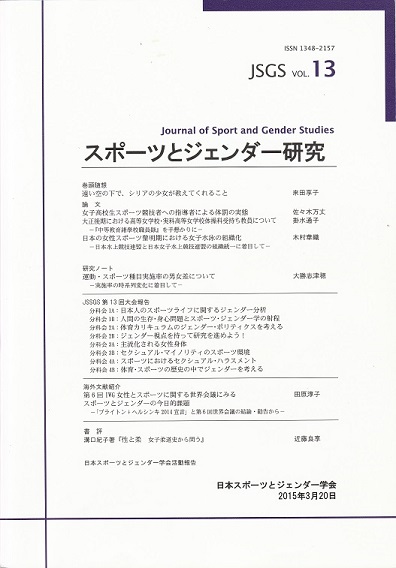Current issue
Displaying 1-15 of 15 articles from this issue
- |<
- <
- 1
- >
- >|
-
2023 Volume 21 Pages 4-5
Published: 2023
Released on J-STAGE: December 21, 2023
Download PDF (150K)
-
2023 Volume 21 Pages 6-17
Published: 2023
Released on J-STAGE: December 21, 2023
Download PDF (675K)
-
2023 Volume 21 Pages 18
Published: 2023
Released on J-STAGE: December 21, 2023
Download PDF (134K) -
2023 Volume 21 Pages 19-36
Published: 2023
Released on J-STAGE: December 21, 2023
Download PDF (448K) -
2023 Volume 21 Pages 37-40
Published: 2023
Released on J-STAGE: December 21, 2023
Download PDF (273K) -
2023 Volume 21 Pages 41
Published: 2023
Released on J-STAGE: December 21, 2023
Download PDF (97K)
-
2023 Volume 21 Pages 42
Published: 2023
Released on J-STAGE: December 21, 2023
Download PDF (132K)
-
2023 Volume 21 Pages 43
Published: 2023
Released on J-STAGE: December 21, 2023
Download PDF (91K) -
2023 Volume 21 Pages 44-56
Published: 2023
Released on J-STAGE: December 21, 2023
Download PDF (559K) -
2023 Volume 21 Pages 57-66
Published: 2023
Released on J-STAGE: December 21, 2023
Download PDF (653K) -
2023 Volume 21 Pages 67-68
Published: 2023
Released on J-STAGE: December 21, 2023
Download PDF (135K)
-
2023 Volume 21 Pages 69-70
Published: 2023
Released on J-STAGE: December 21, 2023
Download PDF (153K)
-
2023 Volume 21 Pages 73-82
Published: 2023
Released on J-STAGE: December 21, 2023
Download PDF (447K) -
2023 Volume 21 Pages 83-86
Published: 2023
Released on J-STAGE: December 21, 2023
Download PDF (240K)
-
2023 Volume 21 Pages 87-89
Published: 2023
Released on J-STAGE: December 21, 2023
Download PDF (207K)
- |<
- <
- 1
- >
- >|
